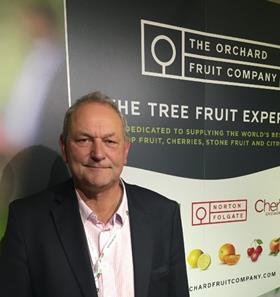
Mark Culley may not quite have seen it all in his 30 years at the helm of OrchardWorld, but he’s certainly seen more than most.
The shift from a market-based to supermarket-based industry, the movement from bricks and mortar to an increasingly digital-focused offer, and the emergence of the likes of the discounters and Amazon Fresh, has meant the topfruit supplier has had to stay nimble and be willing to change in order to stay relevant.
These days OrchardWorld comes under the banner of The Orchard Fruit Company – comprising OrchardWorld and stonefruit and citrus business Norton Folgate – following the decision to diverge from fellow Poupart business BerryWorld. Culley is managing director of both the topfruit division and the umbrella company, and is enjoying the challenges of modern supply as the sector continues to evolve.
Culley was recruited from grower group Anglian Fruit Farmers back in 1989 by the now recently retired Poupart chairman Laurence Olins. His brief was to help set up OrchardWorld as a joint venture between grower Williamson Fruit Farms and Poupart, in what was an industry-leading initiative at the time. “The ambition was that we would have a specialist business for topfruit, which had the biggest market share of any fruit,” Culley recalls. “You had these generalist companies like Saphir and Glass Glover, who were panellists for Capespan and everybody else. The idea was to be a specialist with a global perspective, but English apples sat at the heart of the portfolio.”
The connection with Williamson meant that there was minimal investment needed in the packing and storage business for OrchardWorld, as those facilities were already owned by the grower, but the particularly innovative bit came through utilising those facilities and turning it from a six-month business into a year-round one. That allowed the company to maximise equipment and staff, spread the cost and reinvest back into the business, making sure to provide continuity of supply by importing product from as far afield as Chile and Brazil. “The same model stays good today, and it has been copied by others,” Culley says.
Today OrchardWorld is supplied by two main UK growers – Peake Fruit in Essex and Kent-based Prime Produce. Williamson sold their shares back to Poupart in the 1990s, though Richard Williamson remained as OrchardWorld chairman for many years afterwards.
As OrchardWorld began to establish itself, so the grocery market underwent change too, with a reduction in the number of players, numerous mergers, the rapid growth of Tesco in the 1990s and then, latterly, the emergence of upstarts like the hard discounters and online specialists. As supermarkets reduced the number of suppliers they dealt with and increasingly went direct to source, the company has had to rethink its own strategy in order to progress.
That inevitably meant a shake up in the customer mix, driven both by necessity and opportunity. For many years Sainsbury’s was OrchardWorld’s biggest customer, but as the supermarket took its business more direct the company had to look for other outlets. However, one senses Culley feels entirely at ease with a diverse customer base that now includes the likes of Aldi, Costco, Ocado, Morrisons and Amazon Fresh – a selection of retailers that are largely on the up and growing rather than the stasis that surrounds the biggest players.
And there’s also a refreshing way of working with these newer retailers, according to Culley, describing a relationship that ironically harks back to the old way of doing things. “There could be a lot of customer interference in the day-to-day business with the biggest players, whereas with some of the newer customers the responsibility sits firmly with the supplier,” he explains.
Unsurprisingly for a man who grew up on the farm and whose family have produced topfruit in Essex for three generations, Culley feels a particular affinity with growers. The former Hadlow College student in commercial fruit production recalls how fruit growing in Britain in the 1980s was a particularly challenging job, and one senses his esteem for those who spend their hours toiling to produce top-quality fruit. He speaks warmly about OrchardWorld’s close relationships with growers and packers, pointing out proudly that some of its suppliers have been with the business for the full three decades.
“One of the best things we did was really encourage English growers to plant Royal Gala,” Culley says. “We gave out soft loans and reduced our charges by 50 per cent as a way of convincing growers to plant and backing our conviction, as we were really the first business to recognise that Royal Gala was the thing.” While he believes increasing topfruit consumption won’t come easily, there are still exciting focus areas for the category. Branding, for example, is a relatively new avenue for the business, and the OrchardWorld brand is already appearing in Costco and Ocado. “Brands are coming back,” Culley says. “Supermarkets destroyed brands in the 1990s, but now there are more brands coming in.”
Culley sees OrchardWorld’s future closely tied with the projected growth of its upwardly mobile customers, and it’s clear that the 58-year-old has no plans to take his foot off the accelerator and think about retirement. He recounts with a smile that British Airways informed him that he’s flown around the world 34 times in the past 17 years, but so far that hasn’t translated into fatigue for the job. His favourite destination remains Chile, a country he’s been visiting since 1990 – “to watch the country develop has been fascinating. It’s been transformational,” he says – but above all his main pleasure has come through the many people he’s met and friends made along the way. Many things may change, but friendships have a happy habit of enduring.



